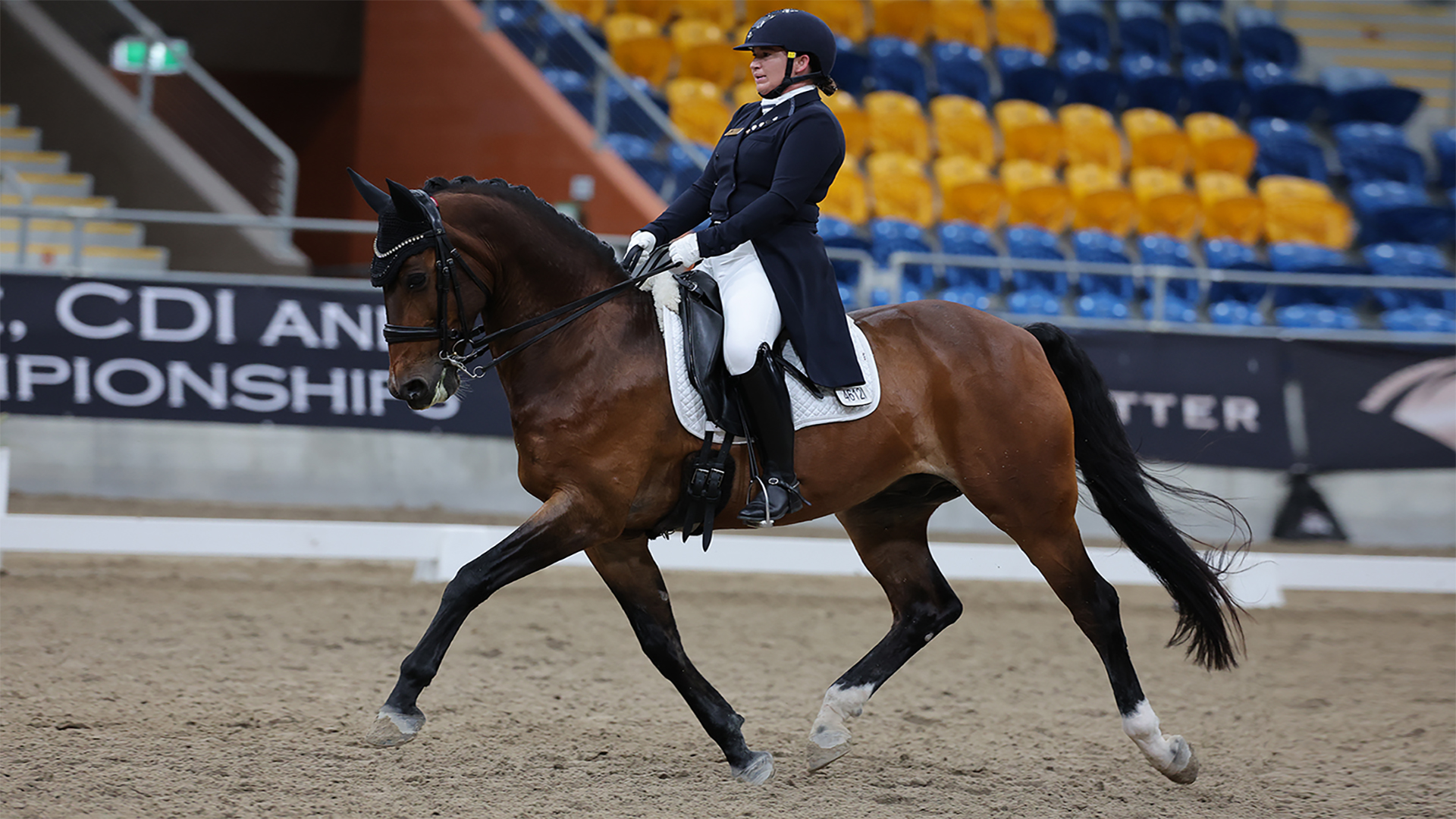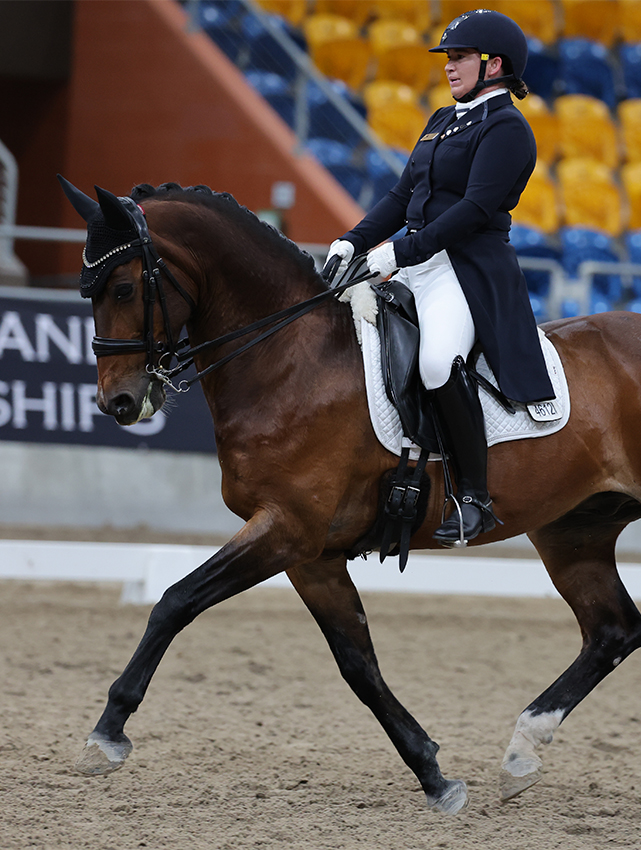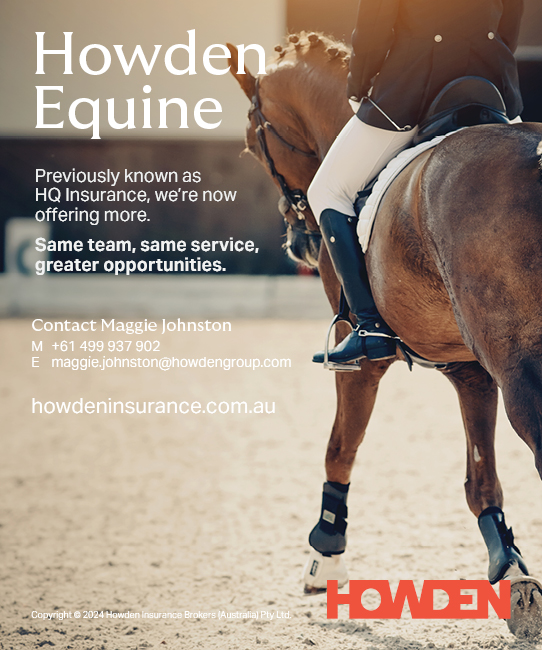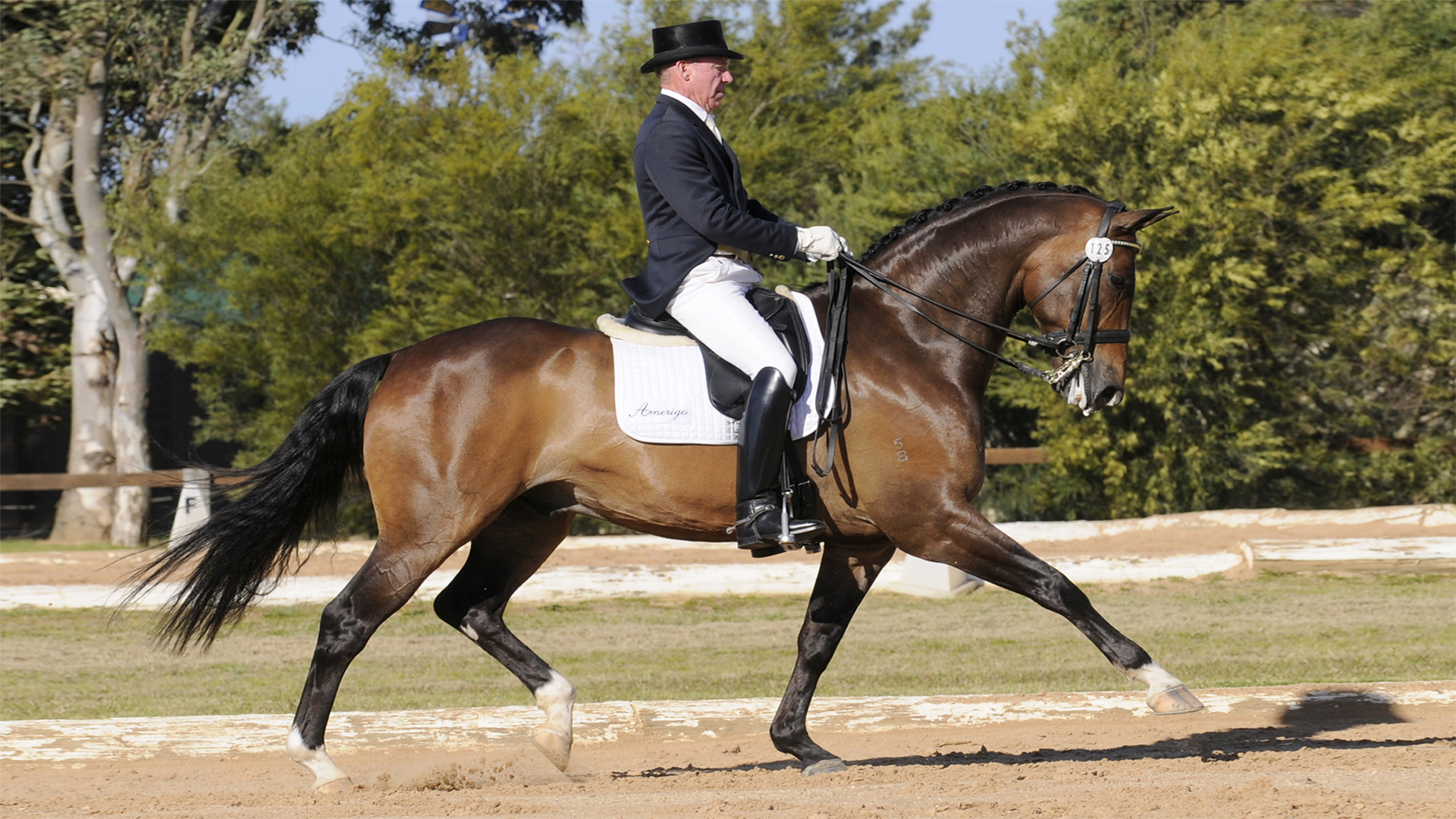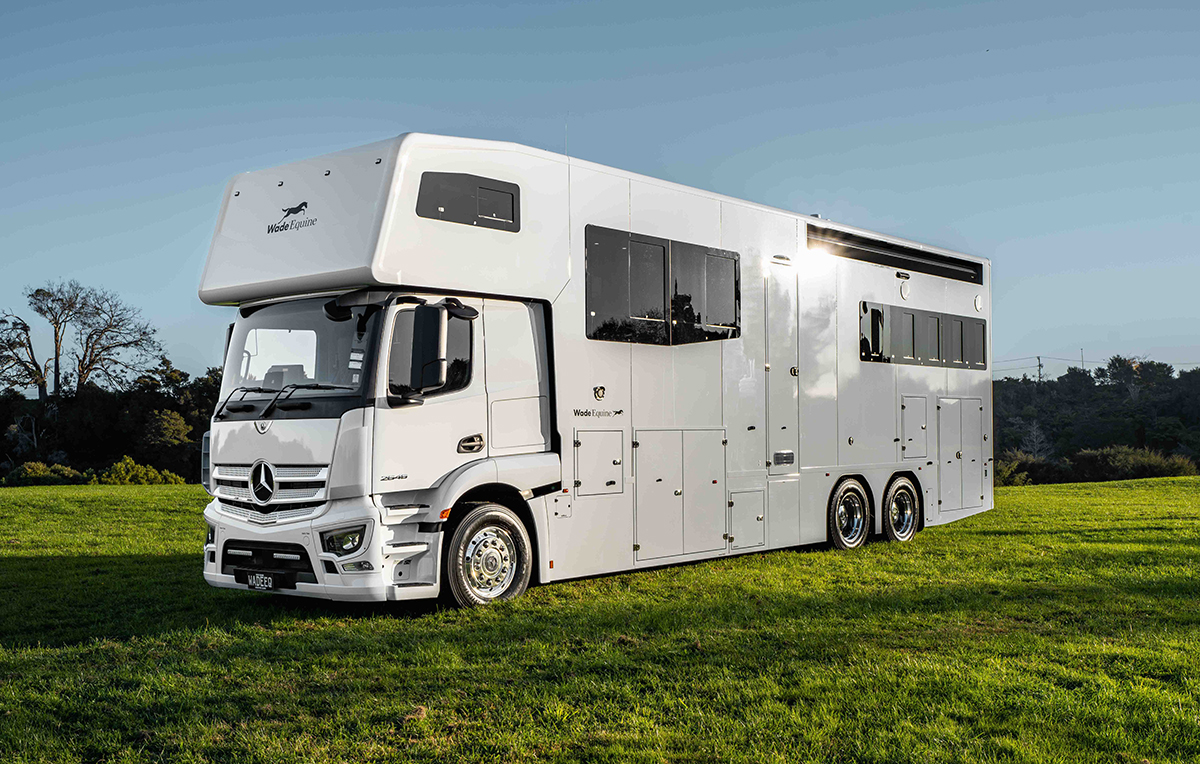“Not one movement has been easy; every single aspect has been a challenge,” laughs Lisel Dingley in reference to her Grand Prix journey with Carousel Oasis. It’s taken a challenging 18 years of training, but last month the pair enjoyed their international-level debut at the Brisbane CDI.

Lisel Dingley and Carousel Oasis finished third in the CDI3* Grand Prix Freestyle at the Brisbane CDI. Image by Derek O’Leary.
Lisa Dingley and Carousel Oasis sparkled under the lights of the Queensland State Equestrian Centre, posting an impressive score of 69.360% in the CDI3* Grand Prix Freestyle to claim third place. The 35-year-old from Chinchilla in Queensland was pleased with the result – but also equal parts relieved to have simply gotten through the test.
“I’m never quite sure what’s going to happen in the Freestyle because he’s so noise sensitive. Sometimes the noise of the music can be too much for him – however, it can also drown out the other noises, which can be a good thing,” explains Lisel.
The pair performed a brand-new Freestyle at the Brisbane CDI, and it all came together on the night. “The music was done by UK company Equidance – the music was absolutely fantastic – and I did the floor plan. We only finished it a week before the CDI, so I’d only ridden through it a couple of times. I didn’t ride through during practise time at the event, because I know how noise sensitive Oasis is and I didn’t want to have him worked up about it.”
“Oasis has been
incredibly challenging
all the way through.”


Lisel bred Carousel Oasis. Image supplied.
In 2007 Lisel bred Oasis, having ridden both of his parents. “I bought his mum, Aeros, as a four-year-old. She was by Aachimedes and was my first real Warmblood dressage horse. She was definitely challenging; we called her Klutz… because she was a klutz!
“I started riding Oasis’ dad, Meilland Troubadour, later in his life. He was a Welsh D and had been doing more showing. I competed him really successfully for a couple of years in the dressage arena, and then he was sold to Paralympian Sharon Jarvis.”
Lisel explains that although she’d ridden a few horses at Small Tour level, Oasis is her first Grand Prix horse.
“I’ve brought him
all the way through.”

Competing with Oasis as a young horse. Image supplied.
“I’ve brought him through all the way,” she explains. “There are definitely some challenging traits in his bloodlines, such as being built a little downhill conformationally; Aeros was, and she did have a challenging temperament as well. I was hoping that Oasis would take after his father, who had an impeccable temperament. But that’s not quite what happened!”
“Challenging horses
make you take the
time to learn things.”

Until this year, Lisel says this was just a normal day with Oasis! Image supplied.
“Oasis has been incredibly challenging all the way through. We barely competed until fairly recently, because he was just too challenging to take out and get around the arena. He took a really, really long time to learn everything. It took us about four or five years to learn a single flying change and then once we started the ones, it took about four years to get to 15 of them!” laughs Lisel. “It took many, many tedious hours of training… but he’s pretty good at the ones now!”
Along the way, Oasis also suffered several health setbacks due to Ross River fever. “I live fairly close to a river, and I have a really big problem with mosquitoes… to the point where we had years where Oasis suffered a lot from Ross River. He would get really sick and need to go to the horse hospital multiple times a year for a week at a time to help him recover. The effects of Ross River on horses doesn’t get talked about a lot. It is a vague virus; it’s hard to know if a horse is suffering from it. It’s often a case of ruling out everything else, and if blood tests show antibodies for Ross River, then you have to assume that if the symptoms present in the right way, it could be that.”

It took Oasis a while to learn a single flying change, but now the one tempi changes are a highlight. Image by Derek O’Leary.
Lisel says there were a few tough years, but at age 18 Oasis seems to be feeling better than ever and perhaps has developed enough immunity to the virus so that these days he no longer becomes unwell.
TRAINING WITH LEONIE
“The challenge about our location is that vets, farriers and coaches basically don’t exist,” explains Lisel. Chinchilla is roughly four hours west of Brisbane; not extraordinarily remote in Queensland terms, but well and truly off the beaten track when it comes to dressage.
“Leonie Bramall is our coach,” she says. Based in Germany, the Canadian Olympian is renowned for producing Grand Prix horses and often travels to Australia for clinics.
“She comes to Toowoomba three or four times a year, and then between that we do very dodgy connection video calls where most of the time Leonie is saying, ‘I can’t see you, I can’t hear you, are you there?’ And she gives me little bits of feedback in the moments where the connection works properly,” explains Lisel, adding that these coaching sessions would not be possible without her dedicated husband standing by the arena holding the phone rain, hail or shine. The joys of internet coverage in rural and remote Australia!
“I was actually very lucky that the Brisbane CDI Freestyle was on at night; it meant that it was daytime in Germany and Leonie was able to warm me up and then watch our test via ClipMyHorse.TV, which was really cool.”
Lisel also recently enlisted Leonie’s help to find her next dressage star. “I had been looking for a horse for a really long time. Leonie found me one in Germany, which was fantastic. His name is Elmo’s Fire VIP and he’s big and chestnut. He’s rising six and a very exciting prospect for the future. He came over in May this year. He hasn’t been out yet; we’re just working away at home.” Elmo is by Estebar out of a Wolkentanz mare – not that it worries Lisel, who firmly believes you ride the horse not the papers.

Lisel first saw Elmo when the sale video came through on the night of her wedding. Image supplied..
Never one to ever make things easy, Oasis went through a period of being “significantly upset” at the arrival of a new horse, but he has thankfully settled down now.
“Elmo is very different to Oasis… he has a fantastic temperament and fantastic way of moving. Everything is just really easy for him, which is a nice change. It’s very different when a horse is conformationally made for the job and has the right aptitude to the work. That’s what they’re bred for… while that doesn’t mean they’re all going to be stars, it does make life easier!”
Lisel says it wasn’t intentional, but the Freestyle she debuted at the Brisbane CDI coincidentally acknowledged her new horse. “A key song in our Freestyle was St Elmo’s Fire (a song by British singer John Parr from the 1985 film St Elmo’s Fire). I thought that was very cool… maybe one day Elmo will get to use that music too.”

Lisel and her new horse, Elmo, with coach Leonie Brammall in Germany. Image supplied.
THE BALANCING ACT
As an elite-level rider who fits in horses around a full-time job, Lisel says it’s not always easy to make it all work – but where there’s a will, there’s a way.
Lisel runs her own company, Dynamic Environmental Services, which provides environmental consultancy to mining, renewable energy and waste companies. “I was looking for a career that would be in a growth industry, and environmental science is clearly becoming more critical,” she explains, adding that it’s certainly more than a nine-to-five job.
“I often have to fly around Australia to complete site inspections. It’s regularly 14-hour workdays and very late nights doing notifications to the government with 24-hour turnarounds, so it can absolutely be a challenge balancing that with training a dressage horse.”
“I can do a lot of my work remotely and at competitions you will often find me in the truck working! I just have to organise it so I’m not doing field work when I’m going to competitions. It it’s good that Oasis is at a time in his career where a week off is definitely not the end of the world.”
To other riders considering balancing elite-level equestrian competition with full-time professional careers, Lisel says it’s hard work – but absolutely possible. “Balancing a professional career and what’s effectively an elite-level sporting career is very rewarding, and they both benefit each other in different ways.”
“Oasis is a testament
to never giving up.”

Lisel feels that Oasis is a testament to never giving up. Image supplied.
NEVER GIVE UP
“You have to learn things that you never otherwise would have needed to learn,” says Lisel of her experiences working with a tricky horse. “You have to be so particular about everything in your way of riding and training, because you make one mistake, and nothing works properly. More forgiving horses, you get a lot more opportunities – but horses that aren’t so forgiving, you must work on it.
“I’ve got lots of skills thanks to Oasis… particularly a lot of skills in groundwork, as I had to do a lot of that – for example, using tools such as TRT Method – because Oasis was very challenging just to handle and to have at competitions. Challenging horses make you take the time to learn things, and then you have those skills for life.”
Lisel also feels that Oasis is a testament to never giving up. “I see so many horses that people don’t progress through with because it all becomes a bit hard. I think this goes to show what perseverance, determination – and probably a bit of stupidity – can achieve. Horses have so much more potential than people often want to acknowledge. Even if they don’t have quite the right conformation, temperament or movement, you absolutely can keep going with them. You just have to persevere, and also be realistic of what they’re going to achieve. They may never be a 70% scoring horse, but they may still be capable of a solid performance at a CDI.”
With Oasis having now achieved 69.360% in a CDI3* Grand Prix Freestyle, perhaps becoming a 70% scoring horse isn’t out of the question. Regardless, the lessons he’s taught Lisel are no doubt worth more than any percentage on a test sheet. EQ
